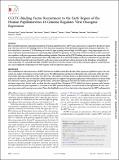CCCTC-binding factor recruitment to the early region of the human papillomavirus type 18 genome regulates viral oncogene expression
Abstract
Host cell differentiation-dependent regulation of human papillomavirus (HPV) gene expression is required for productive infection. The host cell CCCTC-binding factor (CTCF) functions in genome-wide chromatin organization and gene regulation. We have identified a conserved CTCF binding site in the E2 open reading frame of high-risk HPV types. Using organotypic raft cultures of primary human keratinocytes containing high-risk HPV18 genomes, we show that CTCF recruitment to this conserved site regulates viral gene expression in differentiating epithelia. Mutation of the CTCF binding site increases the expression of the viral oncoproteins E6 and E7, and promotes host cell proliferation. Loss of CTCF binding results in a reduction of a specific alternatively spliced transcript expressed from the early gene region concomitant with an increase in the abundance of unspliced early transcripts. We conclude that high-risk HPV types have evolved to recruit CTCF to the early gene region to control the balance and complexity of splicing events that regulate viral oncoprotein expression.
Citation
Paris , C , Pentland , I , Groves , I , Roberts , D C , Powis , S J , Coleman , N , Roberts , S & Parish , J L 2015 , ' CCCTC-binding factor recruitment to the early region of the human papillomavirus type 18 genome regulates viral oncogene expression ' , Journal of Virology , vol. 89 , no. 9 , pp. 4770-4785 . https://doi.org/10.1128/JVI.00097-15
Publication
Journal of Virology
Status
Peer reviewed
ISSN
0022-538XType
Journal article
Description
C.P. was supported by a Ph.D. studentshipfunded by the University of St. Andrews, School of Medicine. I.P. is supported by a Cancer Research UK (CRUK) Ph.D. studentship awarded to J.L.P. and S.R. I.G. and N.C. are supported by a CRUK Programme Award (13080) to N.C. J.L.P. is supported by a Royal Society University Research Fellowship (UF110010).Collections
Items in the St Andrews Research Repository are protected by copyright, with all rights reserved, unless otherwise indicated.

